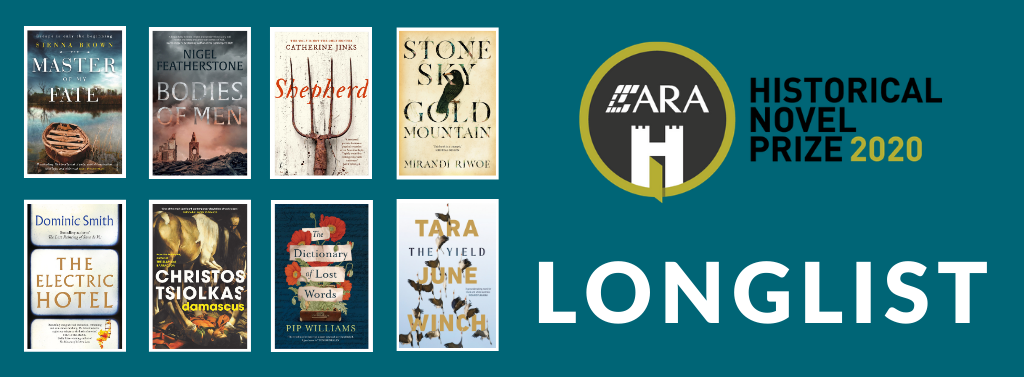
The ARA Group has a history of playing a proud role in the Australian and New Zealand cultural community through its ongoing support of the arts, and literature in particular.
Alongside the work of the ARA Endowment Fund, ARA Group has sponsored the Historical Novel Society Australasia’s biennial conferences since 2017, provides ongoing funding to the Monkey Baa Theatre Company and the National Institute of Dramatic Art, and has continued to be the Principal Partner of the Sydney Writers’ Festival.
Now in 2020, ARA Group is proud to partner with the Historical Novel Society of Australasia (HNSA) to launch a new major literary prize — the ARA Historical Novel Prize — awarding $50,000 to an outstanding novelist in the historical fiction genre. In its inaugural year, the award is designed to give historical novelists the opportunity to be recognised in a class of their own, for the first time ever as part of an Australian and New Zealand literary award.
ARA Group Founder, Managing Director and Executive Chair, Edward Federman, said as arts funding is reduced and the COVID-19 pandemic is affecting authors’ ability to promote their work or earn a living through appearances, now, more than ever, begs the need for corporate support of the arts and literature.
“It’s important we help foster the arts in Australasia to not only enrich people’s lives, creating a culture of reading and writing, but also to ensure our stories and history live on,” Mr Federman said.
Originally funding $30,000 for the prize winner, ARA Group made the recent decision to increase its total funding to $60,000 — with $50,000 to be awarded to one outstanding historical novelist as the overall prize winner and an additional $5,000 to be awarded to each of the remaining two shortlisted authors — placing the ARA Historical Novel Prize in the top five richest literary prizes in Australia.
With the average revenue earned by Australian authors for their writing just $12,900 per year[1], the award’s now $50,000 major prize amount aims to create a truly meaningful impact on the life of the winning author.
“ARA Group has been involved in advocating for and celebrating the arts for many years, and we’re hopeful this prize will have a profound impact on the life of the winning author in this increasingly popular genre and create a lasting legacy.”
ANNOUNCING THE LONG LIST
In conjunction with the Historical Novel Society Australasia (HNSA), ARA Group is excited to announce the eight talented authors, and their outstanding novels, selected in the 2020 longlist for the inaugural ARA Historical Novel Prize:
- Master of My Fate by Sienna Brown (Penguin Books Australia)
- Bodies of Men by Nigel Featherstone (Hachette Australia)
- Shepherd by Catherine Jinks (Text Publishing)
- Stone Sky Gold Mountain by Mirandi Riwoe (University of Queensland Press)
- The Electric Hotel by Dominic Smith (Allen & Unwin Australia)
- Damascus by Christos Tsiolkas (Allen & Unwin Australia)
- The Dictionary of Lost Words by Pip Williams (Affirm Press)
- The Yield by Tara June Winch (Penguin Books Australia).
Applications for the ARA Historical Novel Prize were open to all authors — whether traditionally or self-published — who are residents or citizens of Australia or New Zealand, with books published between 1 January 2019 and 30 June 2020.
Under the entry criteria, historical fiction was defined as a novel written at least 50 years after the events described, or by an author not alive at the time of the events described, who therefore must approach those events only through research.
Linda Funnell, the Chair of the judging panel, said the quality of the 185 entries received was truly remarkable.
“It has been a privilege to see the breadth and quality of historical fiction being written and published in Australia and New Zealand,” Ms Funnell said.
“The judging process has been a challenging one, assessing 185 entries for excellence in writing, depth of historical research, reader appeal, and design. There are many fine books that did not make it onto the longlist, an indicator of the depth and richness of the field.”
HNSA Chair and Author Elisabeth Storrs said she is confident the ARA Historical Novel Prize will ensure authors are proud to call their novel ‘historical fiction’ due to its literary merit, depth of research and reader appeal.
“Historical fiction has the power to enlighten and entertain, and the ARA Historical Novel Prize is a true celebration of the genre, and a real opportunity to foster it on a grander scale. From an account of the very first Oxford English Dictionary, through to life on the Australian goldfields, our longlisted authors tell thrilling tales that are steeped in history, and full of meanings that resonate with audiences all over the world,” Ms Storrs said.
The panel for the prize includes Linda Funnell (Chair), co-editor of The Newtown Review of Books, freelance editor and publishing consultant; Paula Morris, historical novelist, academic and founder of the Academy of New Zealand Literature; Kirsty Murray, historical novelist, Creative Fellow of the State Library of Victoria and Asialink Literature Resident in India; and Colin Falconer, author of over two dozen novels of historical fiction translated across 23 languages.
The ARA Historical Novel Prize shortlist will be announced on Wednesday, 28 October, with the prize winner to be announced by both video broadcast and live stream in Sydney on the evening of Tuesday, 10 November 2020.
More information about the prize can be found at www.hnsa.org.au/ara-historical-novel-prize